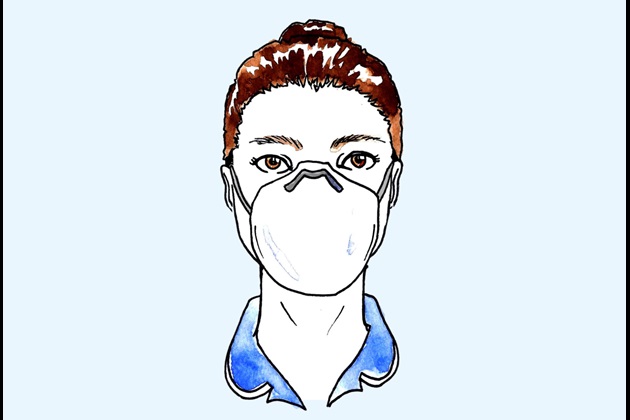RCN safety reps can play a vital role in ensuring employers are carrying out adequate fit tests for members using FFP3 or FFP2 face masks
If a risk assessment indicates that members are required to wear an FFP3 or FFP2 face mask at work, their employer must provide a fit test to ensure the mask fits properly and will adequately protect the wearer. Once a fit test has been completed, members should carry out a fit check themselves every time they put on one of these masks.
“It’s so important that nursing staff know the difference between fit testing and fit checking,” says RCN safety rep Ian Norris. “If members haven’t had a proper fit test then they could be putting themselves, their colleagues and patients at risk.”
As a member of the RCN UK Safety Reps Committee, Ian knows that members’ concerns around fit testing have been widespread. He also knows the crucial role safety reps can play in making sure adequate fit testing is carried out. We caught up with him to find out more.
What are some of the issues around fit testing?
Earlier in the pandemic, the committee became aware that some organisations weren’t carrying out fit tests and were just asking staff to do fit checks, which is totally unacceptable. We’ve also been hearing about cases where staff have failed the fit test for the different masks their employer has available and despite this are still being asked to wear them.
In some cases, managers are telling staff to just tighten the mask and some members have followed this advice, probably in part because they don’t want to let their colleagues down, but also because they might not realise how important a fit test is. This is why it’s essential that we raise awareness about the differences between a fit test and a fit check and make sure members know what should be in place.
If none of the available masks are suitable, organisations should be ordering different masks or considering whether that member of staff needs to have different personal protective equipment (PPE), such as a powered respirator with a hood or helmet, or if they need to be moved to a different clinical area.
We’ve also had reports of infection prevention and control breaches. Some members have told us that they’ve been asked to reuse porous masks during fit testing. Although the hood you put on during a fit test can be wiped down in between tests and used by multiple people, the cloth masks cannot. A new mask must be used for everyone who has a fit test.
It's essential that we raise awareness about the differences between a fit test and a fit check
What can safety reps do to help ensure the right testing processes are in place?
It’s important that safety reps have a good working relationship with their local infection prevention and control leads and health and safety teams. Guidance from the Health and Safety Executive (HSE) also states that employers must consult safety reps on the selection and use of respiratory protective equipment.
You should make sure fit testing is being discussed at your health and safety committee and other relevant meetings, and that the type of testing your employer is using is documented. There also needs to be a clear plan for who will be carrying out the testing and for those people to have the right training and access to the right equipment, such as enough masks.
Another important thing to consider is capacity – if there is a second wave of COVID-19 and everyone in the trust needs to be tested, would there be enough people trained and competent to carry this out properly?
There needs to be a clear plan for who will be carrying out the testing and for those people to have the right training
Safety reps can help raise awareness with managers and members about the differences between fit testing and fit checking. You can also work closely with RCN learning reps to make sure staff have access to information and are being educated on how to protect themselves and when they should be wearing PPE.
Bear in mind that people are still being moved around or, if they’ve been shielding, coming back to very different situations at work. As well as thinking about issues related to COVID-19, we need to work together with learning reps to make sure people are getting the right information, have a proper induction and that any relevant risk assessments are undertaken.
It’s also important for safety reps to feed any issues in through their RCN officer or RCN UK Safety Rep Committee member. During this time of great turmoil, we have really seen the value of safety reps and as well as being able to share issues, we’ve received lots of good ideas and feedback from members working across all settings.
What are the key questions for safety reps to ask?
The key questions for safety reps to consider when looking at fit testing are listed below.
- What areas within the organisation are looking after COVID-19-positive patients or patients suspected of having COVID-19?
- Which of those areas are also carrying out aerosol generated procedures?
- How many staff are working in those areas?
- Have they all been fit tested?
- Are there records of those tests?
- A recent RCN survey highlighted that nursing staff from black, Asian and minority ethnic (BAME) backgrounds are less likely to have an adequate fit test – what measures are in place to ensure that BAME nursing staff who need to wear FFP3 masks are fit tested?
- What measures are in place if someone fails a fit test or if someone is unable to pass a fit test as they have a beard for religious reasons?
- Does the organisation have enough competent fit testers to carry out fit testing?
- If bringing in external fit testing companies, what measures does the organisation have in place to ensure the competence of these fit testers?
- What measures are in place to allow staff to safely raise any concerns they may have about PPE and fit testing?
Good record-keeping is essential. Previously, some organisations were just asking staff to sign in when they attended a fit test but there was no record of which masks they had tested, or which mask was found suitable. This information should be recorded and, ideally, staff should be given a slip to confirm the type of mask they need.
Why is now a good time to be focusing on this?
With many places in the UK experiencing a lull in COVID-19 cases, now is a good time for safety reps to make sure their employer has robust processes in place. This is good preparation for a possible second wave but there are also other factors. Lots of new doctors started on rotation in August and more people are taking on new jobs and moving organisations.
Different organisations may use different brands or types of masks, so people coming from elsewhere will need to be tested again.
At the start of the pandemic, and at its height, there was a rush to test staff so it’s understandable that consistent record-keeping and processes may not have been in place. We now have an opportunity to review that. Even if we don’t need it for another wave of COVID-19, we may well need it for a future flu pandemic so refining these processes now is good practice.
Where can safety reps find more advice?
Safety reps should familiarise themselves with the most up-to-date information from Public Health England (PHE), the Health and Safety Executive (HSE), their employer and the RCN.
At the start of the pandemic, the guidance was constantly changing so it was difficult for people to keep track. The RCN has set up an online COVID-19 resource for RCN reps which pulls together links to relevant information and includes RCN guidance on fit testing, as well as alerts about issues with certain types of PPE.
Use your MyRCN details to log into the RCN's online learning portal or use the link in the RCN Reps Hub.
What should members do if they’re concerned?
Our article Fit Test versus Fit Check explains the differences between the two processes.
If members aren’t sure about something or have any concerns about fit testing in their workplace, they should approach their manager or an infection prevention and control lead in the first instance to check that their understanding is correct or to raise their concerns.
If they still don’t feel comfortable, or don’t feel able to approach their manager, members should contact their local RCN safety rep or contact RCN Direct.
Members can find more information in our guidance PPE – Are You Safe? which includes advice on what to do if fit testing or the right PPE isn’t available.









